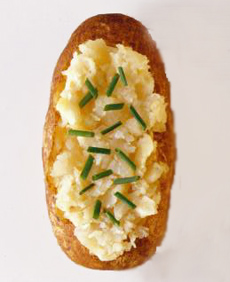TIP OF THE DAY: Lower Calorie Potato Recipes
|
Carb watchers tend to avoid potatoes, along with rice, bread and pasta. But if you leave off the butter, cheese and sour cream, baked, roasted or steamed potatoes can fit into any eating plan.
Potatoes are a source of complex carbohydrates, which provide sustained energy and a feeling of satiety for a longer period of time. Simple carbohydrates—in refined foods such as table sugar, white flour and white rice—lack important nutrients (unless they are “enriched”). These are the carbs to be avoided; instead, go for the nutrient-rich whole versions—honey, whole wheat flour and brown rice. Back to potatoes: Potatoes are moderate in calories, high in fiber and rich in potassium and vitamins B6, C, and folate (B9), among others nutrients. If you pair potatoes with healthful ingredients, you can enjoy them more often without guilt. So today‘s tip is: Investigate how to convert your favorite potato recipes into healthier versions. |
Substitute flavored olive oil for butter and add fresh herbs. If you like sour cream, substitute nonfat Greek yogurt. Photo courtesy Idaho Potato Commission. |
|
|
The healthful ingredients are a simple set: Baked Potatoes |
||
|
|
Boiled Or Roasted Potatoes |
|
|
Nutritionists don’t like deep frying: The potato loses much of its nutrient value, and the cooking oil sinks into the food to add on calories. They suggest oven-baked chips and wedges instead. But if you must deep fry, use a better oil. Or if you’ll use it often enough, get a T-Fal Actifry. It makes fries with just one tablespoon of oil; and cooks many other foods, too. Deep frying requires an oil with a high smoke point. The choice includes canola, grapeseed, peanut, safflower and sunflower oils, plus the lesser-known avocado, rice bran and tea seed oils. Each type of oil has its own unique flavor characteristics, nutritional profile, and shelf life. Price is also a factor. But of the high smoke point oils, the healthy oils are the monounsaturated avocado oil, canola oil and peanut oil. There’s never an easy decision, of course; avocado oil is pricier, canola oil (a trademarked cultivar of rapeseed) is often made from GMO canola, and peanut oil can’t be consumed by people with peanut allergies. Don’t double-fry: The potatoes will absorb even more oil. Avoid saturated fats like Crisco and the darling of top chefs, duck fat. (O.K., try duck fat once, just to see how good it is.) Check out all the types of potatoes and the history of potatoes in our calorie-free Potato Glossary.
|
||



